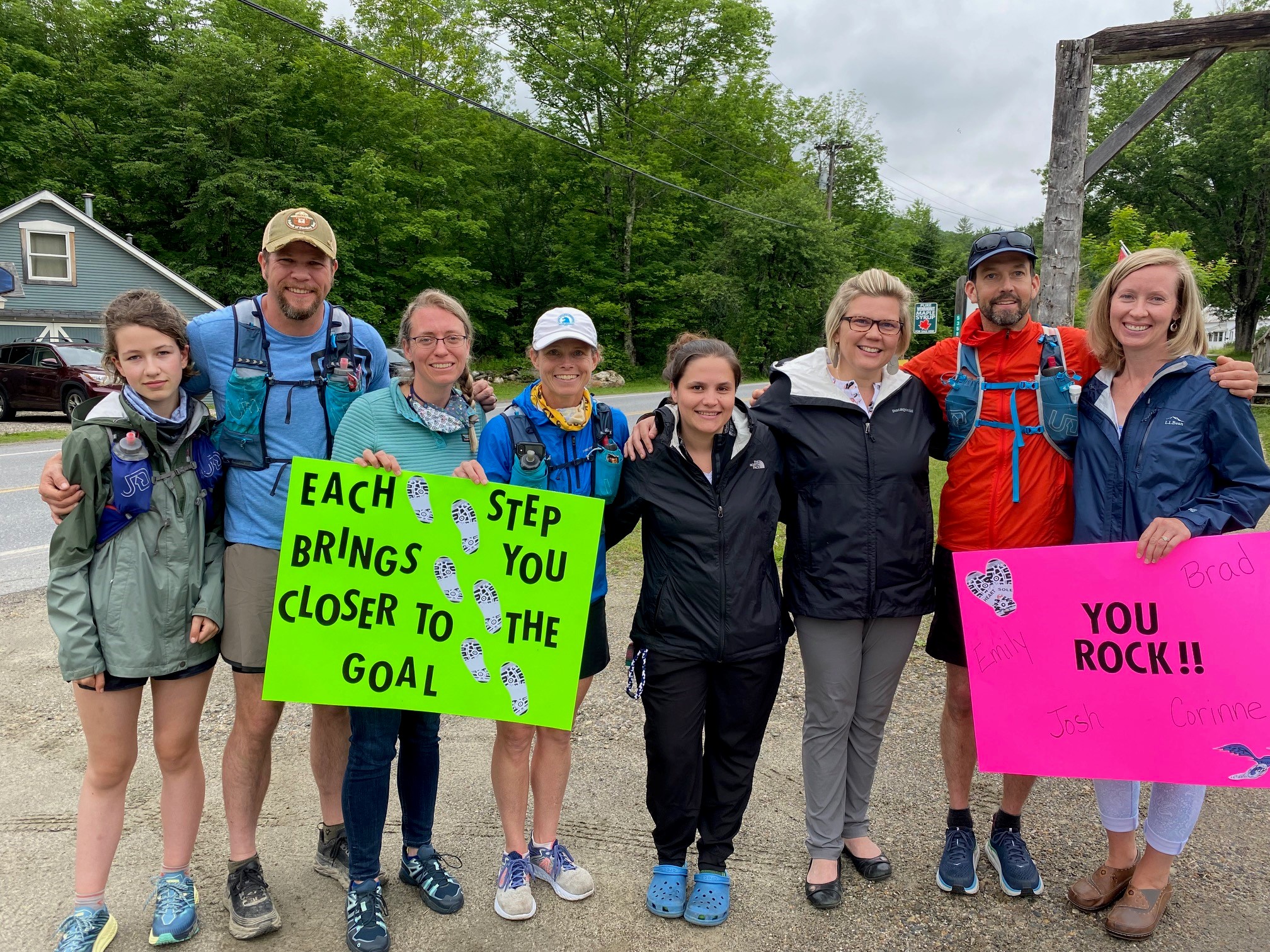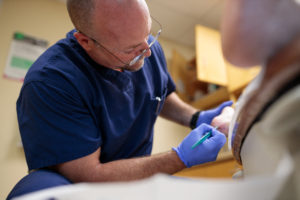

Over the summer, Brad Johnson and his wife Emily LeVan traveled the entire state of Vermont along Rt. 100. Katie and Jennifer (pictured above-on right) worked with Brad using new pump technology and support his active lifestyle through the Diabetes Management Clinic.
Prevention is Our Specialty
Preventing chronic disease, such as Type 2 Diabetes, is at the forefront of patient care. Gifford promotes a supportive, and multi-disciplinary approach for our patients, involving primary care providers, counselors, specialists, and ancillary teams, to navigate these illnesses. The importance of working as a cohesive team and understanding the patient’s lifestyle and desired outcome is always at the center of their care.
A patient’s primary care provider may be the first point of contact when newly diagnosed with a chronic disease. It may be discovered during routine labs at an annual visit, or perhaps after the disease process has begun. These first moments with a provider can impact the experience patients have with their chronic illness. Being able to have a central figure help them navigate both the physical, and emotional impact of a diagnosis is an invaluable service we provide our patients. These clinicians help make the next steps seem less daunting as they educate their patients and connect them to valuable resources, such as referrals to specialists and self-management programs.
“As a provider managing chronic diseases, I have found that utilizing a multidiscipline approach improves that care we offer patients,” states primary care provider, Dr. Emilija Florance. “Fortunately, at Gifford, we have many different options and resources. Whether it be foot care from our Podiatry department, support from our counselors, or medication management from our Diabetes Care Clinic. We even have self-management workshops for patients to better incorporate behavior changes. Diseases like diabetes can feel overwhelming and disheartening but with the right support and team it does not have to be.”
At Gifford’s Diabetes Clinic, Nurse Practitioner, Katie John, and Certified Diabetes Educator, Jennifer Stratton, strive to offer personalized care and support to patients living with Type 1 and Type 2 Diabetes.Their approach is to individualize services which includes diabetes education, medication and prevention advice, nutrition and exercise counseling, and diabetes technology such as insulin pumps and continuous glucose monitoring. The clinic supports patients with pre-diabetes and diabetes and helps guide them as they navigate this chronic illness with a goal of successfully achieving incremental changes that have a big impact.
Patients with diabetes can face many challenges as the disease progresses. According to Gifford Podiatrist, Jon Bjork, “Preventative care is certainly the most effective and important care for diabetes. Our goal is to prevent any possible negative outcomes.”
Gifford’s Podiatry team consists of three well-trained surgical podiatrists who offer complete foot and ankle evaluations to determine if there are any areas of concern in a diabetic patient. High-risk patients who have a history of peripheral neuropathy, PVD, history of ulceration, or history of amputation are of particular concern.

Dr. Nick Benoit is one of three Gifford Podiatrists on staff. One of the specialties of Gifford’s Podiatry team is foot care for people with diabetes.
“We have patients who travel from near and far for their podiatric issues and we take pride in being able to see patients in a timely fashion,” Gifford Podiatrist, Dr. Nicolas Benoit said. “In the event there is concern from the diabetes team we always try to get the patient in as soon as possible for evaluation. I feel we have a strong working relationship and the flow of communication is streamlined and easy. This ultimately benefits the patient.”
While there are many physical components to a chronic illness like diabetes, there can also be a heavy emotional toll that comes with being diagnosed with a chronic illness. Patients may feel discouraged or scared about what the future may hold for them. Gifford’s Psychiatry and Counseling team can support these patients as they come to terms with their new diagnosis and help them reframe their health expectations.
Gifford Social Worker, Emily Pizzale, provides support and guidance for those with a new or existing chronic disease diagnoses. “Counselors and support staff can help identify and increase support networks available to patients and their families, provide resources, as well as assist in long term care planning. The team can assist with communicating with other providers, clarifying diagnosis and prognosis and identify and champion patient’s goals of care. “
For patients with a diagnosis of pre-diabetes, diabetes, or a family history of diabetes, there are additional supports that can help them learn how to reduce their risk or manage their disease.
Gifford offers the Prevent T2 and Diabetes Management courses which introduce behavior change and lifestyle modification as a way to prevent and manage diabetes.

Community Health Team Care Manager-Certified Health and Well-being Coach Walter Ziske leads free healthier lifestyle classes for the community.
Trained facilitator and health coach, Walter Ziske, states that the classes are an extension of a patient’s care, enhancing what they may learn from their primary care provider or specialist. “Every class we have, someone says they received information which was valuable to them and their ability to better manage their health.”
The diabetes self-management courses focus on making small and realistic changes in behaviors such as nutrition, stress management, exercise, and sleep habits, all of which can have a profound effect on the body and disease progression. Making classes like these available to our patients is another way Gifford seeks to provide wrap around and multi-disciplinary care for those with chronic diseases.
Due to COVID these classes have moved to a virtual setting, but the benefits are still there; guidance from a trained and knowledgeable facilitator and the support and encouragement of others in the course. Through the virtual platform, Gifford can offer these free classes to any Vermont resident.
Ziske adds, “chronic illness continues to increase in our community and state. Taking advantage of programs which allow our community members to learn researched based information which then helps them to better manage their health is a win-win; win for our community and a win for Gifford as a cornerstone in healthcare for our community.”
Beyond direct patient care, Gifford works to address diabetes through quality improvement initiatives. The Gifford Diabetes Quality Improvement (QI) Team is focused on addressing continuous systems-level improvements in support of diabetes and prediabetes identification, management, and control with referral to self-management and prevention programming. This work has been made possible through Center of Disease Control grant funds awarded to Gifford via the Vermont Department of Health.
The Diabetes QI Team involves members from across Gifford disciplines including the Community Health Team, Clinical Informatics, Quality Management, senior leadership, and three provider champions. In 2021, the work focused on improving processes for referrals to our Diabetes Prevention Programs, Prevent T2, and Diabetes Self-Management. It created lending libraries for patients to have access to helpful prediabetes and diabetes care literature. It increased referrals to the Gifford Diabetes Clinic and implemented processes to improve access to continuous glucose monitoring for patients with diabetes.
Lastly, the team implemented a health equity project, providing additional supports to a cohort of Gifford patients with diabetes who we found to be disproportionately impacted by diabetes in a negative way. This targeted work is to reduce the burden of chronic disease in Vermonters in our community.
Gifford will continue to address the growing number of patients with chronic disease through preventative care, early intervention, and management. The collaborative nature and multi-disciplinary approach provided by Gifford allows patients to prevent or delay the onset of a chronic illness, learn how to live healthier with a chronic disease, and supports them each step of the way.
When the use of a Continuous Glucose Monitor (CGM) was first suggested to Brad Johnson, who has Type 1 Diabetes, the Northfield native was a bit apprehensive. As an alternative to fingerstick tests, a CGM device is inserted just under the skin and provides real-time blood sugar readings 24 hours a day. It’s used by people who have either Type 1 or Type 2 Diabetes. “I was worried about not being able to keep the sensor and transmitter adhered to my skin, especially in the summer,” Johnson said. Fortunately for Johnson, he had been receiving years of diabetic care through Gifford’s team at the Kingwood Health Center in Randolph. Nurse Practitioner, Katie John, and Certified Diabetes Educator, Jennifer Stratton, sent Johnson home with a CGM to try out. “That’s great service,” Johnson said. “They were patient, listened to my concerns, and gave me great advice.”Today, Johnson, a logger who has had diabetes for close to 25 years, can’t imagine living without his CGM.“It improves the quality of life for me,” Johnson said. “It warns me when my sugar is getting too low or too high, which can be lifesaving. I would never go back now that it is a part of my therapy.”While the CGM is a tool in the diabetes toolbox, it’s also an expensive tool that may not be covered by insurance.“There’s a lot of out-of-pocket costs that come with being a person who has diabetes,” Johnson said.

Husband and wife, Brad Johnson and Emily LeVan traveled the entire State of Vermont on foot raising funds for Gifford’s diabetes program.
“There are definitely different pieces for people that are harder to afford,” Stratton added.
In an effort to help other people with diabetes in his position, Brad and his wife, Emily LeVan, decided to hold a unique fundraiser over the summer. The two traveled the entire state of Vermont on foot along route 100. They raised close to $5,000 for Gifford’s diabetes clinic. Along the route, people heard Brad’s story and wanted to help his cause.
“Whether it was a check or a cup of coffee along the way, it felt great,” Johnson said. “A lot of the general stores gave us free food once they knew what we were doing. We had people stop in their cars, get out and give us cash. They were really encouraging, which for me was one of the best parts of the trip.”
“I was super proud of Brad’s dedication and determination,” LeVan said. “To do the physical part is one thing, but to do it with diabetes and managing the literal and figurative highs and lows that comes with that kind of trip is really inspiring.”
“It’s wonderful that we can show that people with Type 1 diabetes don’t have to be limited by their disease,” Katie John said. “They can do all kinds of amazing physical feats such as running the State of Vermont or anything else they set their mind to.”
Husband and wife, Brad Johnson and Emily LeVan traveled the entire State of Vermont on foot raising funds for Gifford’s diabetes program.
“I’ve been to a lot of different providers and a lot of different clinics, but I just love the approach that Katie and Jennifer provide,” Brad said. “They’re really personable. As much information as they give me, they also listen as well.”
The three have had a special dynamic ever since Brad started going to the Kingwood Health Center several years ago to treat his Type 1 diabetes. During some of those early visits, Katie and Jennifer convinced Brad to use a Continuous Glucose Monitor (CGM) as an alternative to fingerstick tests. A CGM device is inserted just under the skin and provides real-time blood sugar readings 24 hours a day. It’s used by people who have either Type 1 or Type 2 diabetes.
“Being a logger and spending hours working outdoors, I was worried about not being able to keep the sensor and transmitter adhered to my skin, especially in the summer,” Brad recalls. “Katie and Jennifer were patient, listened to my concerns, and gave me great advice.”
That advice included sending Brad home with a CGM to try out. From that point on, he was hooked. Not just on the CGM, but on the quality service provided by Gifford’s Diabetes Care team.
“The care I receive from those at the Diabetes Clinic is in a word, outstanding,” Brad said. “They’re just tireless in their energy and their advocacy.”
Brad’s CGM provides peace of mind and improves his quality of life touting, “It warns me when my sugar is getting too low or too high, which can be lifesaving. I would never go back now that it is a part of my therapy.”
Brad is fortunate his insurance can help pay for a CGM and insulin pump, but he knows others aren’t as lucky saying, “There’s a lot of out-of-pocket costs that come with being a person who has diabetes.”
Stratton adds, “There are definitely different pieces for people that are harder to afford.”
Helping people with diabetes afford these life-changing technologies was the catalyst behind Brad’s fundraising journey through the State of Vermont. That and Brad’s wife, Emily LeVan, had always thought about doing something like this as she is a nationally-renowned and accomplished marathoner.
The news of the fundraiser and the actual physical task of running more than 200 miles came as quite a shock to Stratton and John when Brad told them.
“Brad challenges us, which is what we love,” Stratton said. “He makes us think a little bit harder on how can we help him with what he’s having issues with or how he wants to succeed.”
Brad and Emily started their mission at the Massachusetts border in June. Once community members got word of what Brad and Emily were doing, people did whatever they could to help.
“Whether it was a check or a cup of coffee along the way, it felt great,” Johnson said. “A lot of the general stores gave us free food once they knew what we were doing. We had people stop in their cars, get out and give us cash. They were really encouraging, which for me was one of the best parts of the trip.” But then came the more challenging part of the trip. Brad’s knees and feet put a halt on the action in Stowe, a little more than halfway through their journey.
“It is a common runners’ ailment, and clearly I was not well enough trained for the mileage,” Johnson joked.
Despite the step backward, Brad and Emily weren’t ready to give up. All Brad needed was a little rehab work and there was no better place to receive that treatment than with Gifford’s Physical Therapy team.
“When a patient first comes to see us with pain, such as from an IT band, we listen to what the patient has to say before going through a physical assessment.” Gifford Physical Therapist, Troy Stratton said. “The main goal is to get them back to a good livelihood for themselves and their families.“
“They gave me exercises to do and the IT Band became a non-issue,” Brad said. “After treatment, I was in much better shape than I have ever been.”
Following the physical therapy and a stint back home to recover, Johnson and LeVan picked up where they left off last fall and finished their journey. They may have walked the rest of the way, but Brad and Emily made it to the Canadian border and raised close to $5,000 for Gifford’s diabetes clinic.
“I was super proud of Brad’s dedication and determination,” Emily said after completing the trip. “To do the physical part is one thing, but to do it with diabetes and managing the literal and figurative highs and lows that comes with that kind of trip is really inspiring.”
“It’s wonderful that we can show that people with Type 1 diabetes don’t have to be limited by their disease,” Katie John said. “They can do all kinds of amazing physical feats such as running the State of Vermont or anything else they set their mind to.”Because of Brad Johnson and Emily LeVan’s effort, another person with diabetes will be able to use the same type of tools that helped Brad on his journey across Vermont.
“I used to take one long-term insulin shot and had to deal with the consequences as my schedule changed. I can’t tell you how different it is now,” Brad said. “That’s the message I want to convey to other people.”

